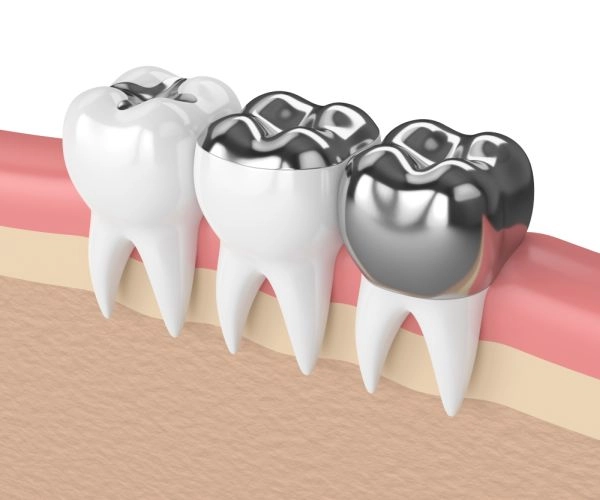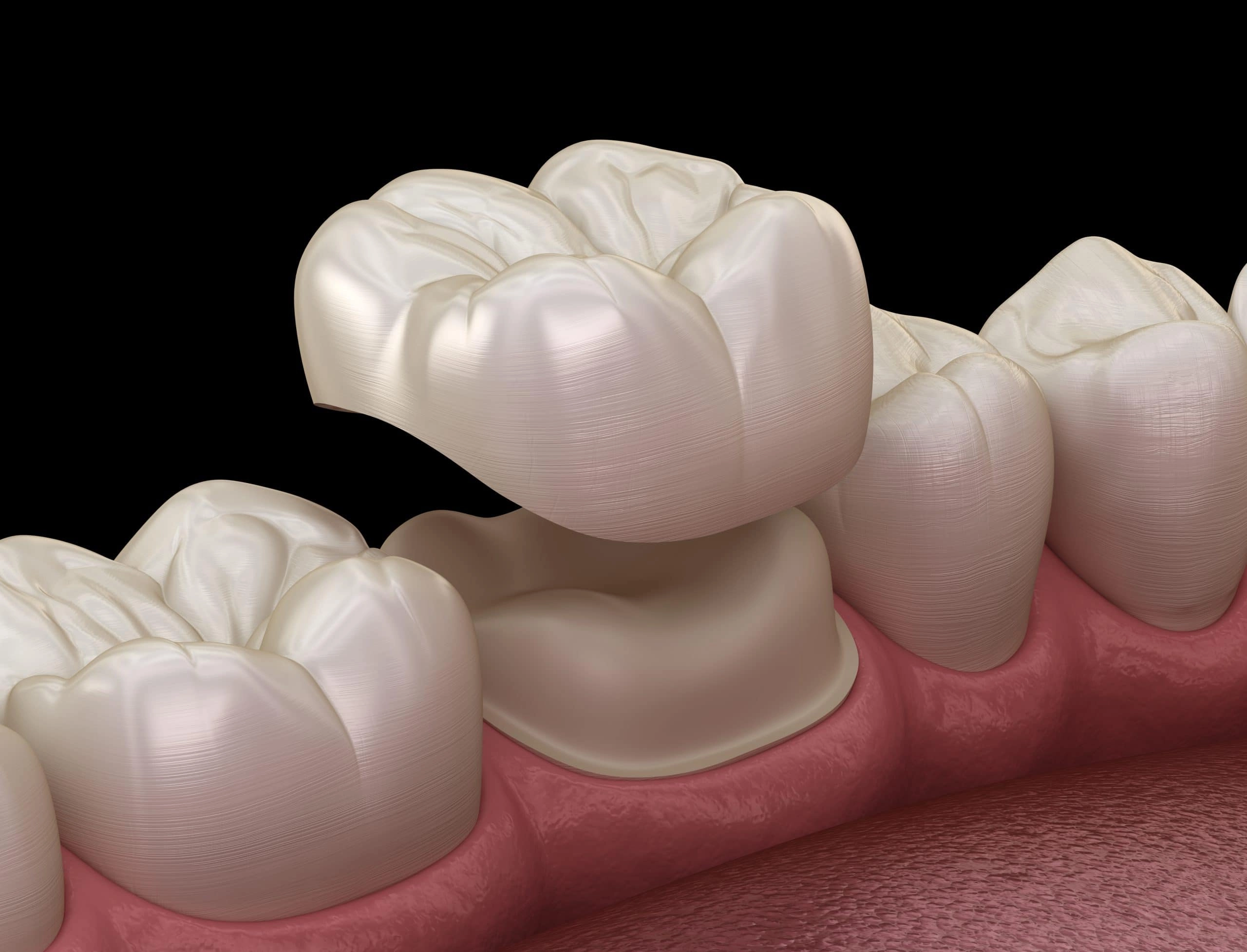Dental Crowns in Fairhope, AL
What are Crowns?
Definition
Crowns are dental restorations that are used to cover a damaged or decayed tooth. They are custom-made to fit over the entire tooth, from the gumline up to the chewing surface. Crowns are typically made from materials such as porcelain, metal, or a combination of both.
Purpose
The main purpose of crowns is to restore the function and appearance of a damaged tooth. When a tooth is severely decayed, cracked, or weakened, a crown can be placed to provide support, strength, and protection. Crowns can also be used to improve the aesthetics of a tooth, enhancing the overall appearance of a person’s smile.
Types of Crowns
There are different types of crowns available, and the choice of material depends on various factors such as the location of the tooth, the amount of damage, and the desired aesthetic result. Some common types of crowns include:
- Porcelain Crowns: These crowns are made entirely of porcelain and are known for their natural appearance. They blend in seamlessly with the surrounding teeth, making them an ideal choice for front teeth restoration.
- Metal Crowns: Metal crowns, such as those made of gold or silver alloy, are known for their strength and durability. They are often used for molars, where their metallic appearance is less of a concern.
- Porcelain-Fused-to-Metal (PFM) Crowns: These crowns have a metal base covered with a layer of porcelain, combining the strength of metal with a natural-looking outer layer. PFM crowns offer both durability and aesthetics.
- Zirconia Crowns: Zirconia crowns are made from a strong, tooth-colored material that is highly resistant to chipping and cracking. They are often used for posterior teeth and are known for their durability.
Benefits of Crowns
Restoration of Function
One of the key benefits of crowns is that they restore the function of a damaged tooth. When a tooth is weakened or has undergone significant decay, it can be difficult to chew or bite properly. A crown provides the necessary support and stability, allowing you to eat and speak comfortably.
Improved Appearance
Crowns can significantly improve the appearance of a tooth. Whether it is a discolored, misshapen, or severely decayed tooth, a crown can restore its natural shape, color, and alignment. With a crown, you can enjoy a beautiful smile that you can be proud of.
Protection for Damaged Teeth
Crowns act as a protective barrier for damaged teeth. They cover the entire tooth structure and provide a layer of reinforcement that helps prevent further damage or decay. By placing a crown on a weakened tooth, you can avoid the need for more extensive dental treatments in the future.
Long-Term Durability
Crowns are designed to be long-lasting and durable. With proper care and maintenance, a crown can last for many years. By choosing a high-quality material and following good oral hygiene practices, you can ensure the longevity of your crown.
Factors to Consider Before Getting Crowns
Oral Health
Before getting crowns, it is important to consider your overall oral health. Your dentist will assess the condition of your teeth, gums, and supporting structures to determine if crowns are the right treatment option for you. If you have underlying oral health issues, such as gum disease or tooth decay, these will need to be addressed before placing crowns.
Budget
The cost of crowns can vary depending on factors such as the material used, the complexity of the procedure, and the location of the dental office. It is important to discuss the cost and payment options with your dentist beforehand to ensure that it fits within your budget.
Personal Preferences
Your personal preferences and goals for your smile should also be taken into consideration. Talk to your dentist about the desired outcome and any specific concerns or requirements you may have. This will help ensure that the crowns meet your expectations and align with your vision for your smile.
The Crown Procedure
Consultation and Examination
The first step in getting crowns is to schedule a consultation with your dentist. During this appointment, your dentist will examine your teeth and discuss your treatment options. They will also take X-rays or impressions of your teeth to plan the crown placement.
Tooth Preparation
In order to accommodate the crown, the affected tooth will need to be prepared. Your dentist will shape the tooth by removing a small portion of the enamel, creating an ideal space for the crown to fit over. This step is typically done under local anesthesia to ensure your comfort.
Impressions
Once the tooth is prepared, your dentist will take detailed impressions of your teeth. These impressions will be used by a dental laboratory to create a custom crown that fits perfectly over your tooth. While the permanent crown is being made, you will be given a temporary crown to protect the prepared tooth.
Temporary Crown
The temporary crown is a temporary restoration that is placed over the prepared tooth until the permanent crown is ready. It provides protection and maintains the appearance of your smile during the waiting period. It is important to follow any instructions provided by your dentist regarding the care and maintenance of the temporary crown.
Crown Placement
Once the permanent crown is ready, you will return to the dental office for its placement. Your dentist will remove the temporary crown and check the fit and appearance of the permanent crown. If everything looks satisfactory, the crown will be bonded to your tooth using a special dental adhesive. Your dentist will make any necessary adjustments to ensure a comfortable fit.
Caring for Crowns
Regular Brushing and Flossing
Maintaining good oral hygiene is crucial for the longevity and health of your crowns. Brush your teeth at least twice a day using a soft-bristled toothbrush and fluoride toothpaste. Floss daily, making sure to clean between the crown and the adjacent teeth.
Avoiding Hard and Sticky Foods
To prevent damage to your crowns, it is important to avoid biting down on hard objects such as ice or opening packages with your teeth. Additionally, sticky foods such as caramel or chewing gum can potentially dislodge or damage the crown, so it is best to exercise caution when consuming such foods.
Routine Dental Check-ups
Regular dental check-ups are essential for the ongoing maintenance of your crowns. Your dentist will examine the condition of your crowns, check for any signs of wear or damage, and address any other oral health concerns you may have. It is recommended to visit your dentist every six months or as advised by your dental professional.
Alternatives to Crowns
Dental Veneers
Dental veneers are thin, custom-made shells that are bonded to the front surface of the teeth to improve their appearance. They are primarily used for cosmetic purposes and can address concerns such as stained, chipped, or misaligned teeth. Veneers are a more conservative treatment option compared to crowns, as they require minimal tooth preparation.
Inlays and Onlays
Inlays and onlays are indirect restorations that are used to repair moderately damaged or decayed teeth. They are typically made from porcelain or composite resin and provide a conservative alternative to crowns. Inlays are placed within the cusps of the tooth, while onlays cover a larger portion of the tooth, extending over one or more cusps.
Dental Implants
For individuals with missing teeth, dental implants are a viable alternative to crowns. Implants are titanium posts that are surgically placed into the jawbone, acting as artificial tooth roots. Once the implant is fully integrated with the bone, a crown can be attached to the implant, completing the restoration. Dental implants offer a long-term solution for tooth replacement, providing stability and a natural appearance.
Choosing the Right Dentist for Crowns
Qualifications and Experience
When selecting a dentist for your crown treatment, it is important to consider their qualifications and experience. Look for a dentist who has the necessary training and expertise in restorative dentistry. They should have a solid track record of successfully placing crowns and a wealth of experience in dental treatment planning.
Technology and Facilities
A dentist who utilizes advanced dental technology and modern facilities can enhance the crown treatment experience. Cutting-edge technology such as digital impressions and computer-aided design (CAD) can improve the accuracy and precision of crown fabrication. Additionally, a comfortable and well-equipped dental office can contribute to a positive treatment experience.
Patient Reviews and Testimonials
Reading patient reviews and testimonials can provide valuable insights into the quality of care provided by a dentist. Look for reputable sources such as online review platforms or ask for references from friends, family, or your general healthcare provider. Positive reviews and testimonials can give you confidence in the dentist’s skills and patient satisfaction.
Understanding the Cost of Crowns
Factors Affecting Cost
The cost of crowns can vary depending on several factors, including the material used, the complexity of the case, and the location of the dental practice. Porcelain crowns are generally more expensive than metal crowns due to the higher quality and aesthetics they offer. Additionally, if additional dental treatments, such as root canal therapy, are needed before crown placement, this can affect the overall cost.
Dental Insurance Coverage
Dental insurance coverage varies widely depending on the specific plan and provider. Some dental insurance plans may cover a portion of the cost of crowns, while others may have limitations or exclusions. It is important to review your dental insurance policy or consult with your insurance provider to determine the extent of coverage for crown treatment.
Payment Options
Many dental practices offer different payment options to help make crowns more affordable. These may include financing plans, credit options, or discounts for upfront payment. Discuss the available payment options with your dentist to determine the best approach that fits within your budget.
Common Myths about Crowns
Crowns Cause Tooth Sensitivity
It is a common misconception that crowns cause tooth sensitivity. While some individuals may experience temporary sensitivity after crown placement, it is typically due to the tooth preparation process rather than the crown itself. Sensitivity should subside within a few weeks as the tooth adjusts to the new restoration.
Crowns Always Look Fake
With advancements in dental materials and technology, crowns can now be made to closely resemble natural teeth. Skilled dentists can carefully match the color, shape, and size of the crown to blend seamlessly with the surrounding teeth, resulting in a natural and aesthetically pleasing smile.
Crowns are Only for Cosmetic Purposes
While crowns do enhance the appearance of a tooth and improve the overall smile, they also serve important functional purposes. Crowns provide strength, support, and protection to damaged or decayed teeth, helping restore proper function, bite, and jaw alignment.
Conclusion
Importance of Crowns
Crowns play a vital role in the restoration and preservation of damaged or weakened teeth. They provide the necessary support, strength, and protection, allowing individuals to enjoy optimal oral health and function. Additionally, crowns can enhance the appearance of the smile, boosting self-confidence and improving overall dental aesthetics.
Taking Care of Your Oral Health
Caring for your crowns is an essential part of maintaining their longevity and ensuring the health of your natural teeth. By practicing good oral hygiene, avoiding damaging habits, and attending regular dental check-ups, you can enjoy the benefits of your crowns for years to come.
Consulting with a Dentist
If you are considering crowns or any other dental treatment, it is important to consult with a qualified dentist. A thorough examination and personalized treatment plan will ensure that your specific needs and goals are addressed. Dentists, such as those at Sweet Water Dentistry, are experienced in providing comprehensive dental care and can help guide you through the crown treatment process with care and expertise. Schedule a consultation today to take the first step towards a healthier and more beautiful smile.





